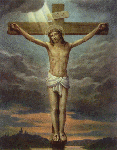
THE SEVEN SACRAMENTS OF THE CATHOLIC CHURCH
| OVERVIEW |
|---|
CONTENTS
Module V.
20. Intro. to the Meaning of a Sacrament
21. Grace is For-Giving and For-Getting
22. Baptism and Confirmation
23. Communion as Reunion: The Eucharist
24. Penance and Anointing of the Sick
25. Marriage and Holy Orders
26. The Lamb's Supper
Scott Hahn's Lectures
Groundwork
Salvation History
Four Marks of the Church
Answering Objections
Families of Faith
Module V looks at the Catholic understanding of sacrament by comparing it to the Old Testament notion of covenant: a blood-oath in which people bind themselves together in solemn and eternal family bonds of allegiance. From there it proceeds into the most solemn and supernatural mystery of all: the Holy Sacrifice of the Mass. Through this solemn mystery, the Catholic Church on earth joins with all of creation in heaven and on earth in an eternal hymn of praise.
PROGRAM OVERVIEW
In this program Scott roots the Catholic understanding of sacrament in
the Biblical conception of an oath, sacramentum in the Latin Vulgate
translation of the Bible. Christianity is the only religion in the world,
Scott explains, which believes that God Himself, in the person of Jesus
Christ, swore an oath establishing a New Covenant binding the Christian
community to Himself.
This program explains how Christ's establishment of the New Covenant, His
solemn oath by which the Christian community becomes the sons and
daughters of God, is expressed in seven specific sacramental oaths. These
sacred oaths, the sacraments, are the means by which God binds human
beings to the Divine Family. Scott explains the sacred and eternal oaths
involved in the Catholic sacraments of Baptism, Penance, Eucharist,
Confirmation, Holy Orders, Marriage and Anointing of the Sick.
This program deals with two of the three Sacraments that bestow an
indelible mark on our souls: Baptism, the Sacrament of rebirth, whereby
we become children of God, and Confirmation, the Sacrament of Battle,
whereby we become soldiers of Christ. These are two Sacraments through
which human beings respond to the divine promise of covenant by pledging
themselves to God in Christ.
In this program Scott explains that it is preeminently in the Eucharist,
the Holy Sacrifice of the Mass, that Christ gives Himself to His people
and establishes the New Covenant. When Catholics receive Communion, Scott
says, they become quite literally what they eat: they become part of the
Body of Christ. "For My body is real food, and My blood is real drink."
(Jn 6:55)
This program deals with how the Sacraments offer spiritual healing. Scott
confronts head-on the secular world view that doubts the need for
spiritual healing as well as the existence of diseases of the soul.
In this final program on the Sacraments, Scott offers excellent practical
advice for young men considering the priesthood. For young couples
pursuing marriage, he explains, how the sacrament of Matrimony is in
fact, a reflection of the Blessed Trinity; where two become one, and
become three. Scott goes on to show how priesthood and marriage are both
means of sanctification for different people.
All of the previous lessons find their fulfillment and climax in the Holy
Sacrifice of the Mass. This program is designed to explain the Catholic
Mass as a Biblical prayer that unites heaven and earth, angels and men,
all of creation in an eternal hymn of praise to God. Scott explains how
the once and for all sacrifice is fulfilled by Christ in the Last Supper
and on the Cross. He shows how Christ is not re-sacrificed but,
re-presented on our altars. He also provides key insights to help us see
the Mass, not as a dead ritual, but as the earthly liturgy reflecting the
heavenly liturgy, which comes to culmination in the marriage feast of the
Lamb as described by St. John in the book of Revelation.